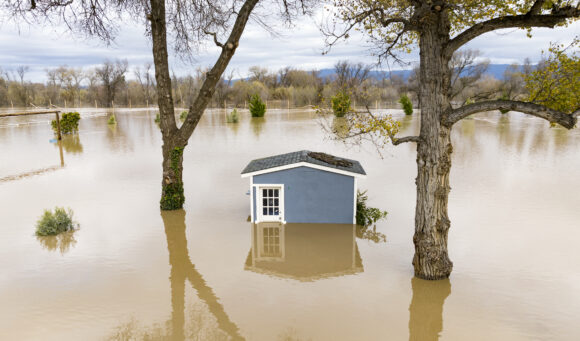
As local weather change worsens excessive climate across the US, floods are growing the chance of dwelling foreclosures, in keeping with a new report by First Avenue Expertise Inc., a climate-data firm.
An enormous a part of the rationale why is that not like harm from hurricane winds and wildfires, flood harm isn’t lined by customary dwelling insurance coverage. Solely a small proportion of People maintain separate flood insurance coverage.
First Avenue analyzed 55 wind, wildfire and flood occasions that befell within the US between 2000 and 2020. It then in contrast the foreclosures charges in affected areas to these in unaffected areas close by for 3 years earlier than and after the occasion. Foreclosures information was collected from county assessor workplaces.
The evaluation discovered that of 16 wind occasions, six had been adopted by a rash of foreclosures. Of 10 wildfires, just one preceded a foreclosures wave. However out of 29 floods, 20 had been adopted by an unusually excessive variety of foreclosures.
The wind foreclosures stemmed from delayed insurance coverage payouts or disputes with insurers, in keeping with First Avenue, whereas the flood foreclosures had been largely as a consequence of lack of insurance coverage. The 9 floods not related to extra foreclosures had been in prosperous neighborhoods the place dwelling values had been rising.
“Mounting flood threat coupled with gaps in flood-insurance protection and low coverage take-up are amplifying losses and triggering foreclosures,” the report states.
The widespread lack of flood insurance coverage may adversely impression credit score markets within the type of higher-than-anticipated mortgage failures.
Utilizing 2012’s Hurricane Sandy as a case research, the analysts discovered that broken properties had been extra prone to be foreclosed on. Lots of extra defaults than anticipated meant $68 million in unanticipated mortgage write-offs.
The analysis highlights the necessity for monetary establishments and regulators to undertake climate-adjusted credit score fashions, Matthew Eby, founder and CEO of First Avenue, stated in a press release. “It’s not enough to judge a borrower’s credit score rating alone. Local weather threat related to the property itself has turn out to be a core determinant of creditworthiness.”
Photograph: Floodwaters from the overflowing Salinas River encompass a constructing in Salinas, California, in 2023. Photographer: Josh Edelson/Bloomberg
Copyright 2025 Bloomberg.
Subjects
Flood
Involved in Flood?
Get automated alerts for this subject.
